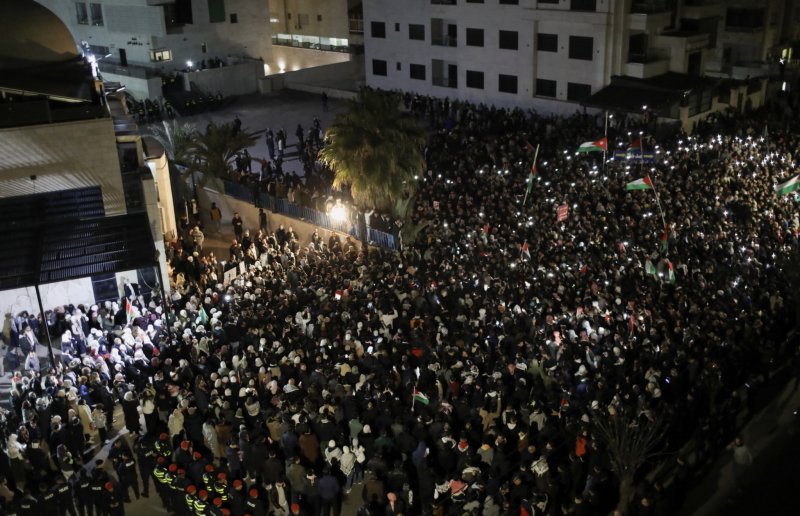
Jordanians gather in front of the al-Kalouti mosque, near the Israeli embassy in Amman, during a demonstration in support of Palestinians in Gaza, Mar. 26. (Credit: Alaa Al-Sukhni/Reuters)
BEIRUT — In the past months, Jordan, which hosts a significant population of Palestinian refugees, has been swept up in massive pro-Palestine protests amid the war on Gaza in which the Israeli army has killed almost 33,000 people. Protesters have also demonstrated against Jordan's peace treaty with Israel, signed in 1994.
Demonstrations have been escalating in recent weeks. Authorities have stepped up their arrests and last week, Jordanian riot police fired tear gas and beat protesters with batons to prevent them from storming the Israeli embassy.
L'Orient Today contacted Amer al-Sabaileh, a Jordanian university professor, geopolitical analyst, and columnist, to get his take on the ongoing protests and the impact they're having in Jordan.
L'Orient Today: To what extent are the demonstrations in Jordan unprecedented, after almost six months of war in Gaza?
Al-Sabaileh: The demonstrations in Jordan today are taking on a new dimension: antagonizing the police and clashing with law enforcement, calls for invading the Israeli embassy or putting it under siege ... All this is something new, but it can be clearly related to the calls by Hamas leaders for mobilizing the Jordanian public and pushing Jordanians to [take] the streets.
Above all, the Muslim Brotherhood wants to make use of this situation ahead of the coming election, which is supposed to take place in around five months. In Jordan, we are experiencing the impact of a regional situation. Hamas is fearing that the operation of Rafah will [mark] its end. [Hamas thinks] that escalating today, putting pressure on a country like Jordan, an ally to the US and the West, might be the best recipe for putting more pressure on Israel and the US and pushing for a political deal.
OT: What does the reaction of the police say about the complex relationship between Amman and Tel-Aviv?
Al-Sabaileh: The [political] relationship between Amman and Tel Aviv, from day one of the Gaza war, was not in its best shape, seeing as Amman took a very extreme anti-Israeli position. Relations have not been good, even in the last few years. So basically — diplomatically and politically — relations are at their lowest.
OT: To what extent is there a real risk of destabilization in Jordan? What factors are at play here?
Al-Sabaileh: The risk of destabilization is high, taking into consideration that there are regional factors and various fronts that are already open. Jordan is facing serious challenges from the Red Sea, Syria, Iraq, and the West Bank, and now, adding to that, [Jordan is facing] internal pressure. Some regional players also believe that creating hotspots in Jordan might help them achieve their goals and lessen the pressure on them. Internal movements and protests will add extra pressure on Jordan, especially with its economic hardships and the serious problems arising from different factors. Therefore the risk of destabilization is increasing and requires more attention from the Jordanian government. The situation is still under control but continuous clashes with the police might create a situation of destabilization.